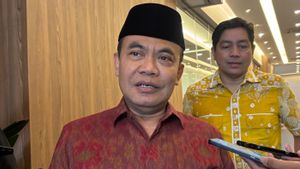JAKARTA - A member of the Advisory Board of Needdem, Titi Anggraini, views the importance of political parties (political parties) prioritizing female cadres elected in the 2024 Pileg.
Titi said one way to do this is by political parties to provide female legislative candidates in first place or number 1 at least in the 50 percent electoral district (dapil) of the 2024 General Election.
The electoral districts in Indonesia increased from 80 to 84 electoral districts after the expansion in the Papua region. That way, the number of DPR seats increased from 575 to 580 seats.
"It means, if you want more women to be elected in parliament, political parties must place more women in serial number 1 of the list of candidates for DPR members at least 42 electoral districts," said Titi in Semarang, Central Java, Monday, February 27, as reported by Antara.
Titi said the results of the 2019 Election showed that more than 60 percent of women elected in parliament were those in serial number 1.
If political parties really support women's representation, especially if the number of female voters is more than men, according to him, political parties should not hesitate to place female candidates in serial number 1, at least 50 percent of the total electoral district.
On the other hand, he revealed that the kicked seats system or blocked seats could guarantee the representation of women at least 30 percent of the total legislative members, both in the DPR, Provincial DPRD, and district/city DPRD.
"Current guarantees that at least 30 percent of women will be selected in parliament, it can only be done if the affirmation policy implemented is a kicked seats system or blocked seats for women's minimum electability in parliament," he said.
Titi, who is also an election teacher at the Faculty of Law, University of Indonesia, is of the opinion that the divest seats scheme in a closed proportional system even though it must also be correlated with the nomination method, placement in serial numbers, and distribution of seats in prospective seats.
He explained that voice seats are a certain percentage of seats in parliament, government agencies, educational institutions, or other public organizations provided specifically for women.
The implementation of this system, he said, is to overcome the historical marginalization of women and to promote gender equality by ensuring that women have equal representation and opportunities in these areas.
According to him, the percentage of seats that are restored for women can vary depending on certain countries and organizations. In some cases, the percentage of fixed seats is provided specifically for women, while in other cases, a number of seats are allocated to female candidates based on their performance in the selection or other selection process.
He stated that the seats that are reservationed on women's quotas are still controversial. The problem is, some argue that it promotes positive discrimination and is contrary to meritocracy principles.
Meanwhile, others argue that it is necessary to promote gender equality and address the weaknesses and historical obstacles that women face.
"The technical implications are not simple. Therefore, the Constitutional Court will have many limitations in dealing with the impact of technical aspects and its electoral management," he said.
The English, Chinese, Japanese, Arabic, and French versions are automatically generated by the AI. So there may still be inaccuracies in translating, please always see Indonesian as our main language. (system supported by DigitalSiber.id)













